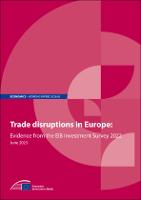EIB Working Paper 2023/02 - Trade disruptions in Europe
Evidence from the EIB Investment Survey 2022
| dc.contributor.author | EUROPEAN INVESTMENT BANK | |
| dc.date.accessioned | 2023-06-30T05:30:59Z | |
| dc.date.available | 2023-06-30T05:30:59Z | |
| dc.date.issued | 2023 | |
| dc.identifier.uri | https://library.oapen.org/handle/20.500.12657/63712 | |
| dc.description.abstract | Using firm-level data from the EIB Investment Survey, this paper describes how firms in the European Union have been affected by recent trade-related shocks, such as disruptions to logistics or access to materials, and how they have responded to them. The responses of firms differ. They include diversification of trade partners and refocusing on domestic markets and suppliers. The paper looks at the differences between firms that help to explain these different reactions. It finds that younger, larger, more productive firms are more likely to respond actively to trade shocks and disruptions, especially through diversification of trade partners. Less productive and less innovative firms, meanwhile, are more likely to be discouraged from direct engagement in international trade. | |
| dc.language | English | |
| dc.rights.uri | Copyright held by content provider | |
| dc.title | EIB Working Paper 2023/02 - Trade disruptions in Europe | |
| dc.title.alternative | Evidence from the EIB Investment Survey 2022 | |
| dc.type | book | |
| oapen.identifier.doi | 10.2867/24420 | |
| oapen.relation.isPublishedBy | 66479d04-7b84-49c0-9a4d-db552a3ecc71 | |
| oapen.relation.isFundedBy | b818ba9d-2dd9-4fd7-a364-7f305aef7ee9 | |
| oapen.collection | Knowledge Unlatched (KU) | |
| oapen.imprint | European Investment Bank | |
| oapen.identifier | https://openresearchlibrary.org/viewer/fa810617-62c1-4ffc-b92b-de7d276a8bd2 |

